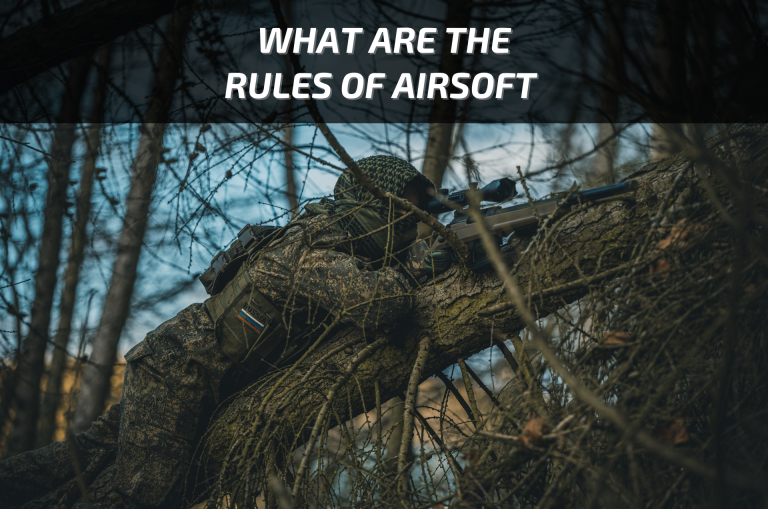
While airsoft can be a fun and exciting activity, it is essential to remember that the safety rules of Airsoft should always be a top priority.
To guarantee the safety of all participants, specific guidelines and regulations must be followed. This post delves into the rules of airsoft and the importance of responsible gameplay.
Whether you are a seasoned player or a beginner, it is essential to understand and follow these rules to ensure a safe and enjoyable experience for all.
Safety rules
Safety is the most critical aspect of airsoft gameplay, and several rules must be followed to ensure the safety of all participants.
One of the essential rules of safety in airsoft is eye protection. All players must wear full-seal goggles or glasses that meet specific safety standards to protect their eyes from injury.
Another essential safety rule is the FPS (feet per second) limit. Each airsoft gun has a specific FPS limit that must not be exceeded, as higher FPS can cause serious injury. Barrel covers must also be used to prevent accidental gun discharge when not in use.
In addition to these rules, medic rules are also enforced in many airsoft games. Hit players may need to wait for a designated medic to revive them before they can continue playing.
Field limits are also essential to ensure the safety of players. Each field may have different limitations on gameplay area, number of players and types of weapons allowed.
Following these safety rules is crucial to prevent injuries and ensure that airsoft remains a safe and enjoyable activity for all players.
Conduct rules
Airsoft gameplay also involves conduct rules that promote fair play, honesty, and good sportsmanship. Fair play is essential to maintaining a positive and safe environment during airsoft games. This includes following the rules and respecting other players.
Hit calling is another important conduct rule in airsoft. When a BB hits a player, they must call themselves out and exit the game until the next round. Refusing to call hits can result in penalties and ruin other players’ experiences.
Cheating and dishonesty are not tolerated in airsoft and can result in penalties or expulsion from the game. Good sportsmanship is also encouraged, including congratulating opponents on good moves or fun and respecting other players’ gear and property.
Referee authority is a crucial part of airsoft conduct rules. The referee has the final say in disputes; all players must follow their instructions. Failure to do so can result in penalties or removal from the game.
By following these conduct rules, players can ensure a fun and respectful gameplay experience for all participants.
Gameplay rules
Different game modes, including elimination, capture the flag, and scenario games, can be played.
Spawn rules determine where players can enter or re-enter the game after being eliminated. These rules may vary depending on the game mode and field.
Ammo limits may also be imposed to ensure players don’t run out of ammo too quickly or use too much. Grenades and explosives may also be used in some games but must be used safely and responsibly.
Knife kills can also be allowed in some games, but specific rules must be followed to ensure safety. For example, players may be required to use a special airsoft knife or to only use it for tapping opponents rather than physical contact.
Equipment rules
Equipment rules are crucial for airsoft to ensure safety and fair play. Gun and gear restrictions may vary depending on the field or game mode, and players must follow these restrictions to participate.
Players must treat their airsoft guns as real firearms. Chronographing is also necessary to ensure that guns are shooting at a safe FPS limit.
Magazine restrictions may be imposed to prevent players from carrying too much ammunition or using high-capacity magazines, giving them an unfair advantage.
Melee weapon rules may also be in place for games that allow airsoft knives or other weapons. Players must follow these rules to ensure these weapons are used safely and responsibly.
Field-specific rules
Field-specific rules may vary depending on the type of field being played on. Indoor areas may have different rules compared to outdoor fields, and close-quarters battle (CQB) fields may have different rules compared to open-field scenarios.
Safety and play zones can be designated on the field, where players must adhere to specific rules or avoid using certain weapons or tactics. Special restrictions for distinct game modes or events, such as limited ammo or no respawn rules, may also exist.
Legal issues
Airsoft players should also be aware of the legal issues surrounding the sport. Age restrictions may vary depending on the country or state, and players may need to obtain licenses or permits to own or operate certain types of airsoft guns.
Local and state laws may also differ, and players should familiarize themselves with these laws to avoid legal issues. Liability and waivers may also be a concern, especially when playing on private property or at events hosted by airsoft organizations.
Players should understand how to interact with law enforcement officials and abide by any regulations or laws regarding the transportation and storage of airsoft guns. It is essential to follow all legal guidelines and rules to avoid potential legal issues and maintain the safety and reputation of the sport.
Conclusion
Airsoft is an exciting activity requiring players to follow the rules for safety and fair play. Adhering to these rules ensures that everyone involved can enjoy the game without the risk of injury or harm.
Safety rules such as eye protection, FPS limits, barrel covers, and medic rules are essential for minimizing accidents and preventing serious injuries. Practices such as fair play hit calling, and sportsmanship promotes a positive and enjoyable experience for all players.
Equipment rules, field-specific rules, and legal issues must also be considered to ensure a smooth and legal game.